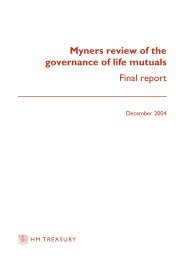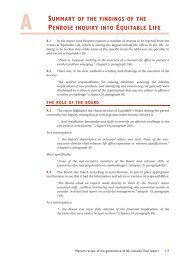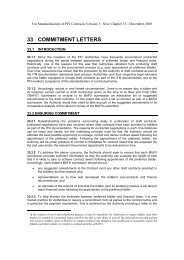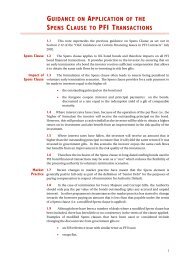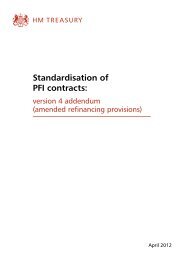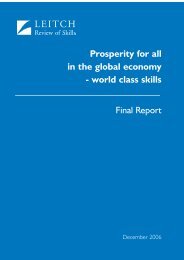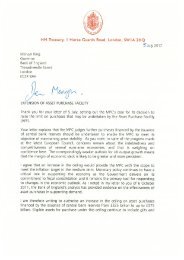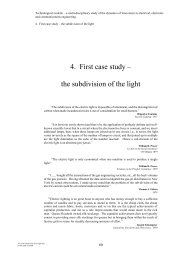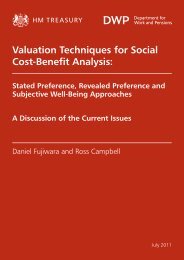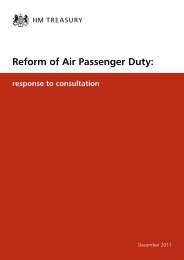Valuing Our Natural Environment Final Report ... - HM Treasury
Valuing Our Natural Environment Final Report ... - HM Treasury
Valuing Our Natural Environment Final Report ... - HM Treasury
Create successful ePaper yourself
Turn your PDF publications into a flip-book with our unique Google optimized e-Paper software.
<strong>Valuing</strong> <strong>Our</strong> <strong>Natural</strong> <strong>Environment</strong> – <strong>Final</strong> <strong>Report</strong> - Annex1<br />
A1.2 Deliberative and Participatory Valuation Methods<br />
A1.2.1 Questionnaires and Interviews<br />
A1.2.1.1 Objectives<br />
Questionnaires aim to elicit statistically significant information on public attitudes,<br />
attributes, behaviours, the reasons behind these, and so on. Interviews may focus less on<br />
statistical significance and more on detailed discussions of the issues and how respondents<br />
think and behave. A key interest in questionnaire research is often the ability to analyse<br />
correlations between demographic and attitudinal factors, and to explore links between<br />
responses to different questions using statistical tests and regression analysis.<br />
A1.2.1.2 Value concept encapsulated<br />
In theory, any concept of value can be captured via questionnaires and interviews, from<br />
general statements of ethical principles through to concrete choices between specific<br />
conflicting options. The questions can be framed in “consumer” or “citizen” contexts,<br />
though the ways in which respondents choose to reason and respond can not be controlled.<br />
Questions can cover monetary values, including stated monetary values, and/or values as<br />
revealed through (stated) behaviour: several non-market economic valuation methods are<br />
dependent on questionnaires or interviews.<br />
A1.2.1.3 Theoretical basis<br />
In asking individuals to respond to pre-prepared questions, questionnaires may range from<br />
quite general issues and attitudes to highly specific questions about particular issues,<br />
policies or behaviours. One or more questions may involve economic valuation of an<br />
environmental good or service via some stated preference technique although generally in<br />
such cases the whole questionnaire is designed around the valuation instrument, rather<br />
than the valuation forming a small part of a questionnaire (for example, see contingent<br />
valuation fiche).<br />
If the questionnaire is administered face-to-face or as a telephone survey it is often the<br />
case that a survey professional will conduct the exercise. Sampling of respondents is often<br />
based on some form of demographic quota, and results may be weighted to fit population<br />
descriptors (e.g. age, gender, class, geographical area, income). Postal and internet<br />
surveys may also attempt weighting of the results rather than the sample (which is much<br />
harder to control).<br />
Questions will often be pre-coded (e.g. agree/disagree, on a scale of 1 to 5, etc.) though<br />
there may be a limited number of open ended questions allowing respondents to make<br />
more discursive responses (which can then be difficult and/or time consuming to code and<br />
analyse). Generally respondents will not have the opportunity to seek additional<br />
clarification.<br />
Interview techniques can range from straight questionnaires through semi-structured to<br />
depth interviews. The continuum is from a clear set of coded questions to a format in<br />
which there is a general set of topics to be covered but many responses are open and uncoded,<br />
and the interview becomes more of a discussion between respondent and<br />
interviewer. This then requires skilled and knowledgeable interviewers who can follow up<br />
with supplementary questions where required. This is a task for researchers in the area<br />
rather than survey professionals.<br />
A1.2.1.4 Process of implementation<br />
Any questionnaire will require the following stages:<br />
1. Scoping the issue, framing key topics for questions, setting initial questions - this stage<br />
will involve review of existing knowledge, and may draw on additional focus group or<br />
other stakeholder work.<br />
eftec A30<br />
December 2006



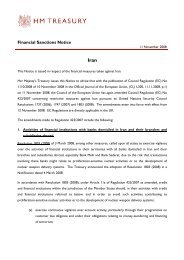
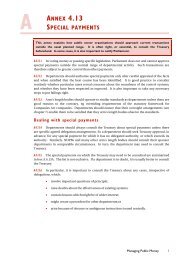
![AIRTO [Professor Dr Brian Blunden] - HM Treasury](https://img.yumpu.com/15492848/1/184x260/airto-professor-dr-brian-blunden-hm-treasury.jpg?quality=85)
